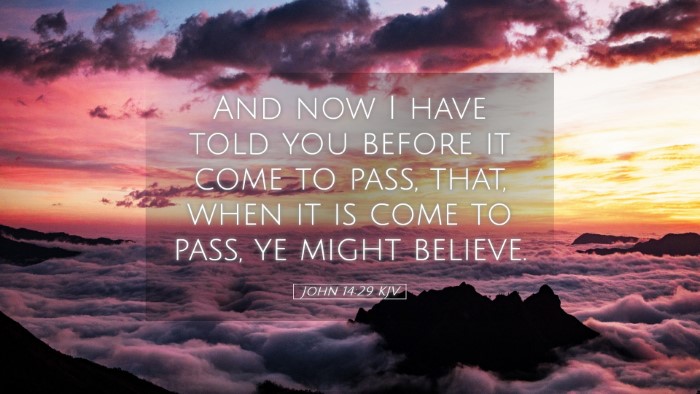Commentary on John 14:29
Verse: “And now I have told you before it come to pass, that, when it is come to pass, ye might believe.”
Introduction
John 14:29 is a profound statement made by Jesus to His disciples during His farewell discourse. This verse conveys the dual themes of prophecy and faith, and it serves as both a promise and a preparation for what is to come.
Contextual Overview
The setting of this verse is crucial for understanding its impact. It takes place shortly before Jesus’ crucifixion, when He is preparing His disciples for the events that will unfold, including His death and impending resurrection. This passage is embedded in a larger discourse (John 14-16) where Jesus provides comfort, assurance, and teaching to His followers.
Insights from Public Domain Commentaries
1. Matthew Henry's Commentary
Matthew Henry emphasizes the foresight of Jesus in this verse. He notes that Jesus tells His disciples things before they happen to strengthen their faith. When the prophesied events occur, they would have solid evidence confirming His divine nature and the truth of His words. The key takeaway from Henry is that prophecy serves as a bolster for belief; knowing in advance allows the disciples to trust Jesus more fully.
2. Albert Barnes' Notes on the Bible
Albert Barnes highlights the importance of Jesus revealing future things to give His followers confidence. He articulates that it is part of God's benevolence to prepare believers for upcoming trials. Barnes elaborates on how foreknowledge serves to build a stronger foundation of faith among believers. According to Barnes, this foretelling was both a test and a reassurance, providing a framework for the disciples to navigate their forthcoming grief and confusion over Christ's departure.
3. Adam Clarke's Commentary
Adam Clarke provides a detailed examination of the implications of this verse on the concept of faith. He argues that faith is not blind but rather grounded in knowledge. Clarke emphasizes that the act of Jesus telling them in advance was to foster trust and reliance on Him. He also stresses the necessity of this knowledge for the disciples to endure the trials that were about to come, suggesting that divine foresight is a key element in ensuring true belief and perseverance.
Theological Implications
This verse has significant theological implications for understanding the nature of prophecy, faith, and God's divine sovereignty. Jesus, aware of the challenges ahead, does not leave His disciples in ignorance. Instead, He equips them with the knowledge of future events, indicating that God is intimately involved in the course of history.
1. Assurance of God's Plan
The verse reassures believers that God has a plan that unfolds in history. By foretelling these events, Jesus signifies that nothing happens outside of God's sovereign control. This serves as a reminder to pastors and theologians that we can trust in God’s providence even amidst confusion and difficulties.
2. The Role of Belief
Belief is central to the Christian faith, and this passage underscores the connection between knowledge and faith. When believers understand the prophecies and their fulfillment, their faith is strengthened. This has pastoral implications, as leaders are encouraged to help their congregations grasp the fullness of Scripture to fortify their beliefs.
Application for Today
In a world filled with uncertainty, the message of John 14:29 remains profoundly relevant. Believers today are called to reflect on how they can trust in the promises of God as revealed through Scripture. This understanding assists in building a robust faith that can weather life's storms.
1. Encouragement for Personal Faith
Individuals must seek to deepen their understanding of the ways God has revealed His plans through Scripture. This encourages a more profound personal faith rooted in the truth of the Word.
2. Ministerial Charge
For pastors and ministers, this verse serves as a charge to preach and teach with clarity about the prophecies of Scripture. By elucidating these truths, leaders can guide their congregations toward a deeper trust in God's promises.
Conclusion
John 14:29 encapsulates the essence of divine foreknowledge as a means to strengthen faith. The insights drawn from Matthew Henry, Albert Barnes, and Adam Clarke enrich our understanding of this verse, reminding all believers of the unchanging nature of God’s promises. As we reflect on this verse, let us hold firmly to the truths that our faith is built upon the prophetic words of Christ, who knows the end from the beginning.


